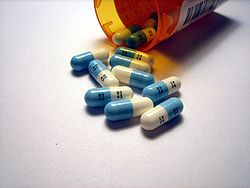In a new issue of Biological Psychiatry, published by Elsevier, researchers from the National Institutes of Health report that another medication, scopolamine, also appears to produce replicable rapid improvement in mood.Scopolamine temporarily blocks the muscarinic cholinergic receptor, thought to be overactive in people suffering from depression. [continue reading…]
Antidepressants
Can psychiatry be a science? New Yorker article Head Case by Louis Menand on the science and philosophy of depression.
You arrive for work and someone informs you that you have until five o’clock to clean out your office. You have been laid off. At first, your family is brave and supportive, and although you’re in shock, you convince yourself that you were ready for something new. Then you start waking up at 3 A.M., apparently in order to stare at the ceiling. You can’t stop picturing the face of the employee who was deputized to give you the bad news. He does not look like George Clooney. You have fantasies of terrible things happening to him, to your boss, to George Clooney. You find—a novel recognition—not only that you have no sex drive but that you don’t care. You react irritably when friends advise you to let go and move on. After a week, you have a hard time getting out of bed in the morning. After two weeks, you have a hard time getting out of the house. You go see a doctor. The doctor hears your story and prescribes an antidepressant. Do you take it? Link to read more
Source: New Yorker


Fluoxetine HCl 20mg Capsules (Prozac)
Researchers at UQ’s Queensland Brain Institute have uncovered how antidepressants stimulate the brain to improve a person’s mood.
They have discovered the class of drugs that increase levels of a neurotransmitter known as ‘norepinephrine’ triggers neurogenesis – the growth of new neurons – in a brain region called the hippocampus.
“If you block hippocampus neurogenesis, antidepressants no longer work,” lead researcher Dr Dhanisha Jhaveri said.
“That suggests antidepressants must up-regulate neurogenesis in order for them to actually have any affect on behaviour.”
However, the neuroscientists also found not all antidepressants worked in the same way. [continue reading…]
Physicians use a variety of therapies to treat depression, including antidepressant medications. A new study reviewing research on these drugs shows while they offer a substantial benefit in treating very severe depression, they seem to have little or no effect treating mild or moderate depression. Catherine Dolf has more in this week’s JAMA Report.
Source: American Medical Association (AMA)

